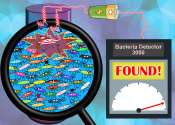Preserving the contents of the New York Public Library in a teaspoon of protein, without energy, for millions of years
Books can burn. Computers get hacked. DVDs degrade. Technologies to store information—ink on paper, computers, CDs and DVDs, and even DNA—continue to improve. And yet, threats as simple as water and as complex as cyber-attacks ...









